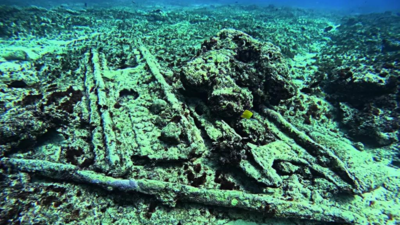CHENNAI: A group of divers exploring marine life near Kalpeni island in the Lakshadweep archipelago stumbled on Saturday morning upon the wreck of what, it appeared, had been a warship.
Going by the nature of the wreck, researchers believe the ship, fitted with cannon, might have belonged to any of the three European powers – Portuguese, Dutch, or British – and was sunk sometime during the fight for supremacy over the ancient maritime route connecting the Middle East and Sri Lanka in the 17th and 18th centuries.
“When we spotted the wreck on the western side of Kalpeni, we didn’t know it was a warship. When we found a cannon and an anchor, we realised it could be an important find,” said Satyajeet Mane, a marine explorer who led the group of divers from Brannadives, on the condition of anonymity.
They said they would inform the local authorities about the find. “We found it at a depth of just four or five metres at the mouth of a lagoon. The wreckage appears to be spread over the deeper parts of the Arabian Sea,” said Mane. “Going by the size of the ship, the cannon, and the metal, it could be a European warship. More exploration is needed.”
Idrees Babu, a scientist at the department of science and technology and a mentor to the divers’ group, said such a shipwreck has not been recorded in the region earlier. tnn
“The ship might have been 50m-60m in length. The East India Company started using iron ships on this trade route in the 17th century or 18th century. We need underwater archaeological studies to learn more about it; till then we need to protect the site,” he said.
When the British used iron ships, the Portuguese continued to use ships made of iron and wood. “The coral growth on the wreckage and corrosion makes it difficult to immediately ascertain if the ship was made fully of iron or it had components of wood too. The coral growth indicates it has been submerged for a few centuries,” said Mane.




